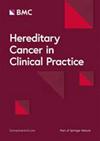Reflex BRCA1 and BRCA2 tumour genetic testing for high-grade serous ovarian cancer: streamlined for clinicians but what do patients think?
IF 2.4
4区 医学
Q3 ONCOLOGY
引用次数: 3
Abstract
Reflex (automatic) BRCA1 and BRCA2 (BRCA1/2) genetic testing of tumour tissue is being completed for all newly diagnosed high-grade serous ovarian cancer (HGSOC) in the province of Ontario, Canada. The objective of this study was to measure the psychological impact of tumour genetic testing among individuals with a new diagnosis of HGSOC. Participants had a new diagnosis of HGSOC and received reflex BRCA1/2 tumour genetic testing as a component of their care. Eligible individuals were recruited from two oncology centres in Toronto, Canada. One week after disclosure of tumour genetic test results, consenting participants were asked to complete a questionnaire that measured cancer-related distress, dispositional optimism, knowledge of hereditary breast/ovarian cancer, recall of tumour genetic test results, satisfaction, and the psychological impact of receiving tumour genetic test results. The Multidimensional Impact of Cancer Risk Assessment (MICRA) questionnaire was used to measure the psychological impact of tumour genetic testing. 76 individuals completed the study survey; 13 said they did not receive their tumour test results. Of the remaining 63 participants, the average MICRA score was 26.8 (SD = 16.3). Higher total MICRA scores were seen among those with children (p = 0.02), who received treatment with primary surgery (p = 0.02), and had higher reported cancer-related distress (p < 0.001). Higher dispositional optimism (p < 0.001) and increasing age (p = 0.03) were associated with lower total MICRA scores. Most (83.5%) participants reported being satisfied/highly satisfied with having tumour testing completed; however, 40.8% could not accurately recall their tumor test results. This study is the first to assess psychological outcomes following reflex BRCA1/2 tumour genetic testing in women newly diagnosed with HGSOC. Increased dispositional optimism provided a protective effect, while increased cancer-related distress increased the psychological impact of tumour genetic testing. Educational resources are needed to help increase patient understanding and recall of tumour results, particularly when tumour genetic testing includes analysis of genes that may have implications for hereditary cancer risk. Additional research is required to better understand the patient experience of reflex tumour genetic testing.高级别浆液性卵巢癌的反射性BRCA1和BRCA2肿瘤基因检测:临床医生简化,但患者怎么想?
在加拿大安大略省,所有新诊断的高级别浆液性卵巢癌(HGSOC)正在完成肿瘤组织反射(自动)BRCA1和BRCA2 (BRCA1/2)基因检测。本研究的目的是测量肿瘤基因检测对新诊断为HGSOC的个体的心理影响。参与者有新的HGSOC诊断,并接受反射BRCA1/2肿瘤基因检测作为其护理的一部分。从加拿大多伦多的两个肿瘤中心招募符合条件的个体。在肿瘤基因检测结果公布一周后,同意的参与者被要求完成一份调查问卷,包括癌症相关的痛苦、性格乐观、遗传性乳腺癌/卵巢癌的知识、肿瘤基因检测结果的回忆、满意度和接受肿瘤基因检测结果的心理影响。癌症风险评估的多维影响(MICRA)问卷用于测量肿瘤基因检测的心理影响。76人完成了研究调查;13人说他们没有收到肿瘤检查结果。在其余63名参与者中,平均MICRA得分为26.8 (SD = 16.3)。有孩子的患者(p = 0.02)、接受初级手术治疗的患者(p = 0.02)和报告的癌症相关痛苦较高的患者(p < 0.001)的总MICRA评分较高。较高的性格乐观(p < 0.001)和年龄的增加(p = 0.03)与较低的总MICRA得分相关。大多数(83.5%)参与者报告对完成肿瘤检测感到满意/非常满意;然而,40.8%的人不能准确地回忆起他们的肿瘤检查结果。这项研究首次评估了新诊断为HGSOC的女性进行反射性BRCA1/2肿瘤基因检测后的心理结果。增加的性格乐观提供了保护作用,而增加的癌症相关的痛苦增加了肿瘤基因检测的心理影响。需要教育资源来帮助提高患者对肿瘤结果的理解和回忆,特别是当肿瘤基因检测包括可能与遗传性癌症风险相关的基因分析时。需要进一步的研究来更好地了解反射性肿瘤基因检测的患者体验。
本文章由计算机程序翻译,如有差异,请以英文原文为准。
求助全文
约1分钟内获得全文
求助全文
来源期刊
CiteScore
3.10
自引率
5.90%
发文量
38
审稿时长
>12 weeks
期刊介绍:
Hereditary Cancer in Clinical Practice is an open access journal that publishes articles of interest for the cancer genetics community and serves as a discussion forum for the development appropriate healthcare strategies.
Cancer genetics encompasses a wide variety of disciplines and knowledge in the field is rapidly growing, especially as the amount of information linking genetic differences to inherited cancer predispositions continues expanding. With the increased knowledge of genetic variability and how this relates to cancer risk there is a growing demand not only to disseminate this information into clinical practice but also to enable competent debate concerning how such information is managed and what it implies for patient care.
Topics covered by the journal include but are not limited to:
Original research articles on any aspect of inherited predispositions to cancer.
Reviews of inherited cancer predispositions.
Application of molecular and cytogenetic analysis to clinical decision making.
Clinical aspects of the management of hereditary cancers.
Genetic counselling issues associated with cancer genetics.
The role of registries in improving health care of patients with an inherited predisposition to cancer.

 求助内容:
求助内容: 应助结果提醒方式:
应助结果提醒方式:


